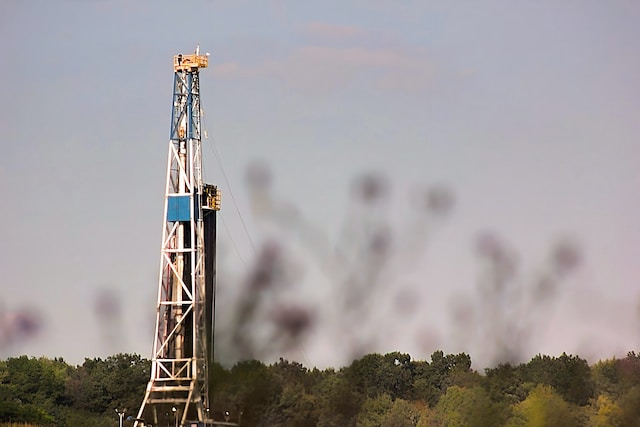Featured image: Fracking well. The damage that causes earthquakes seems to occur after the drilling, when the wastewater is injected deep underground, stimulating existing fault lines. Indigenous and other communities want Colombia to join France, Germany, Scotland and Bulgaria in banning fracking. By Thinkstock.
by Rick Kearns / Indian Country Today Media Network
Fracking is coming to indigenous Colombian territories and other parts of the country, and activists are trying to halt the process.
The controversial process known as fracking, short for hydraulic fracturing, involves injecting water, sand and various chemicals at high pressure into subterranean rocks, so as to force open existing fissures and extract oil or gas.
Environmentalists, scientists and others around the world have asserted that fracking can contaminate surface water and subterranean aquifers and has been linked to earthquakes and low birth rates among other things. At least four countries – France, Germany, Scotland and Bulgaria – have banned fracking and other countries and regions are considering similar measures.
On March 22, close to 40 environmental organizations, trade unionists and land defenders known as the Alliance for a Colombia Free of Fracking sent a public letter to Colombian President Juan Manuel Santos, asking him to issue a moratorium on fracking due to it’s potential harm to the environment and to thousands of Indigenous and other Colombians living near the wells.
According to an April report, the Colombian government had granted 43 gas and oil concessions to various corporations including multinationals such as ExxonMobil. ConocoPhillips and Drummond Ltd.
The activists note in the letter that fracking has been associated with increased seismic activity. They point to a study showing how wastewater fracking wells in Oklahoma cause a dramatic increase: from 50 seismic events at a level of 3 in 2010 to 400 level 3 earthquakes in 2014, an 800 percent jump.
“And in terms of public health,” the Alliance letter continued, “there are studies from the U.S., Canada and the European Union that connect the proximity of people to the areas where fracking activities are carried out with cases of neural tube alterations (The neural tube is the structure in the embryo that ultimately forms the brain and spinal cord), births with low birth weight, other birth defects and an increase in the incidence of congential heart problems.”
The activists asserted that “there is evidence that emissions from wastewater fracking wells can travel through the air to residential zones where they can cause asthma…”
Some of the fracking areas overlap with Yupka, Wiwa and Wayuu territories and activists have noted that these projects would violate the land rights of these Indigenous Peoples and potentially others.
While none of these communities have issued press statements regarding fracking, two of the largest Indigenous organizations have identified the process as a serious problem in past reports.
In September of last year, the National Indigenous Organization of Colombia (ONIC) published a statement by the allied Association of Indigenous Councils of Northern Cauca (ACIN) about the peace process between the government and the FARC guerillas. In that statement they pointed out that the Indigenous communities were worried about the government’s policies involving “extractavism” and “fracking” and the lack of prior consultation of the communities which is against Colombian and international laws.
In response to the recent developments the Alliance group known as the Corporation for the Defense of Water, Territory and Ecosystems (CORDATEC) held a two day conference on April 19 and 20 on “The Social-Environmental Impact of Fracking” in an area already affected by gas exploration.
Among the panel topics at the conference were “Environmental Impact” and “Resistance and Social Conflicts.”
As of press time President Santos had not publicly responded to the letter from the Alliance.
Photo by Brad Weaver on Unsplash

